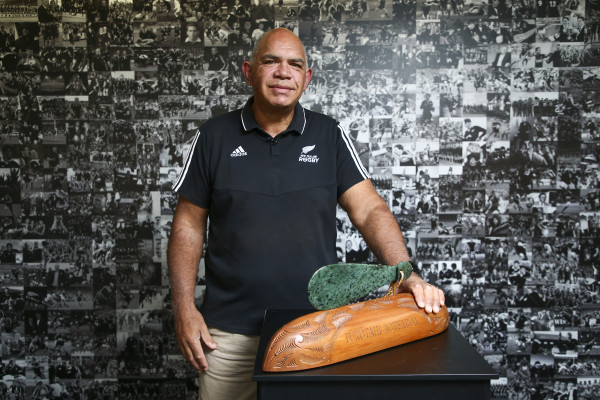Rugby mourns the loss of much-loved Kaumatua Luke Crawford
14 December 2024
Kua hinga te totara haemata, te totara whakamarumaru o te wao nui a Tane. Kua kore ngā manu e rere. Kua ngū te ngāhere. Mōu te take, Matua Luke. Aue, aue, aue taukiri e!
The towering Totara tree, the sheltering giant has fallen. The forest has gone silent, no birds are flying. We are all in mourning for you, Matua Luke Crawford. Farewell our friend, mentor, our Matua.
New Zealand Rugby, the New Zealand Māori Rugby Board and the entire rugby community are mourning the passing of Luke Mikaire Crawford (Ngāti Tūwharetoa, Ngāti Porou and Ngāti Toa via his ancestor, Puhiwahine).
Matua Luke has a long and storied association with rugby and was NZR’s Kaihautu Māori (Chief Advisor Māori) from 2018 and Māori All Blacks Kaumatua since 2010.
Widely regarded as one of rugby’s most respected Māori leaders, Matua Luke was a trusted advisor to people and teams at all levels of the game.
A former policeman who dedicated his life to serving his community, he was a gifted speaker, writer and musician, who was passionate about the ability for Māori culture and rugby to change lives and bring people together.
Rugby’s thoughts and love are with Luke’s wife Stephanie, his children, Hutana and Abigail, son in law, Lachie, and his wider whānau (family).
NZR CEO Mark Robinson said:
“Matua Luke was a wonderful man and a real taonga for our organisation and the entire game in Aotearoa New Zealand. I know that our rugby community will feel this news deeply as we come together over the coming days to remember this incredible man.
“Our thoughts are with Luke’s whānau, and I’d like to thank them for sharing so much of him with rugby. He leaves an amazing legacy in our game.”
During his time at NZR, Matua Luke transformed the organisation’s commitment and use of tikanga Māori.
Under his leadership, NZR established a set of values for the sport known as Te Ara Ranga Tira (The Rugby Way) which have been instrumental in rugby’s progress as a safe, inclusive and welcoming sport.
The values are Te Pou Maioha (Be Welcoming), Te Pou Hiranga (Be Your Best), Te Pou Ihiihi (Be Passionate) and Te Pou Tika (Play Fair).
NZR Chair Dame Patsy Reddy said:
“Luke was a truly great man and a wonderful friend to me personally. There is not a single part of rugby that hasn’t been changed for the better by Luke’s leadership and passion for tikanga Māori. His impact on rugby is both profound and immeasurable.”
His knowledge and expertise of tikanga Māori saw Matua Luke work with global brands to promote and celebrate Māori culture and rugby with the world.
He was instrumental in the creation of the All Blacks Experience attraction in Auckland, ensuring te ao Māori and te reo Māori were embedded in the story of rugby in New Zealand.
Alongside his good friend and artist, Dave Burke, the pair designed Māori All Blacks jerseys for adidas and introduced the use of taonga in rugby to replace traditional silverware.
These taonga include the Bill Osborne Taonga, Super Rugby Pacific, Tukotahi Aotearoa (stand as one, New Zealand), Ian Kirkpatrick Medal, Bunnings Warehouse New Zealand Rugby Club of the Year, Te Hāpai Community Impact and the Super Rugby Aupiki trophy, Hineruhi (the dawn maiden).
A central part of the Māori All Blacks for over a decade, Matua Luke was passionate about the team’s ability to unify and inspire New Zealanders and fans around the world.
He was highly respected by players and management for connecting Māori to their whakapapa (ancestry), and instilling a deep understanding of the importance of where they come from and who they represent, unleashing what he often referred to as their ‘superpowers’.
New Zealand Māori Rugby Board Chair Dame Professor Farah Palmer said:
“Matua Luke was a mighty pou for New Zealand Rugby. His genuine warmth and willingness to share Te Ao Māori with the rugby world created many learning opportunities. We always felt safe and privileged when he led a process, thoughtfully selected and blessed taonga and teams, and shared pūrākau to enrich our places, people and purpose.
We feel this loss deeply, and our thoughts and aroha are with Steph and the whānau during this very sad time.”



